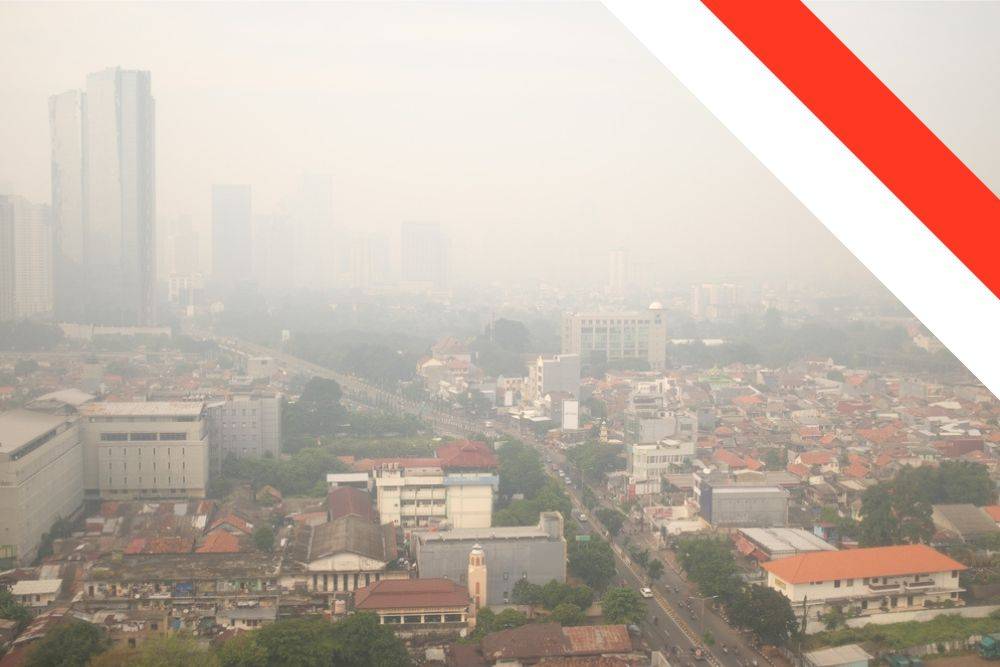Jakarta, a bustling metropolis marking its 497th anniversary, was overshadowed by a pressing concern: its deteriorating air quality.
According to IQAir, a Swiss tech company specialising in air quality analytics, Jakarta’s air quality index (AQI) soared to 223 on June 18, categorising it as “very unhealthy.” This grim reality poses severe health risks, particularly to children, who are highly vulnerable to the adverse effects of air pollution.
Government Response to Air Pollution
Reacting to public concern, Jakarta’s Deputy Governor, Heru Budi Hartono, acknowledged the severity of the situation. While he conceded that air pollution is a global challenge, critics argue that local efforts remain inadequate. Measures such as cloud seeding and high-rise fogging have been attempted, yet their effectiveness in curbing pollution levels remains dubious.
Criticism of Government Actions
Critics argue that the government’s response has been insufficient, focusing more on temporary fixes rather than addressing the root causes of Jakarta’s air quality crisis. The reliance on short-term solutions underscores the need for a comprehensive strategy that tackles pollution sources head-on.
Effective Solutions for Air Pollution
Enforcing Existing Regulations
Stringent enforcement of vehicle age restrictions is essential to mitigate the impact of vehicular emissions. Older vehicles, known for their higher pollutant output, significantly contribute to Jakarta’s poor air quality. By strictly regulating the circulation of older vehicles, the government can reduce overall emissions and improve air quality.
Transitioning to Cleaner Fuels
A pivotal step towards cleaner air involves transitioning from fossil fuels to sustainable alternatives like biofuels. Biofuels offer a cleaner combustion profile and emit fewer pollutants than traditional fossil fuels. Supporting this transition with incentives and infrastructure will further accelerate the adoption of cleaner energy sources across Jakarta.
Improving Public Transportation Infrastructure
Investing in robust public transportation systems is crucial for reducing private vehicle usage and associated emissions. Enhancing the accessibility, efficiency, and coverage of buses and trains encourages more residents to opt for public transit, thereby alleviating traffic congestion and lowering overall pollution levels.
Collaborative Efforts for Lasting Change
Addressing Jakarta’s air quality crisis necessitates collaborative efforts between local and national governments. Coordinated strategies prioritising sustainable urban development and environmental conservation are indispensable for achieving long-term improvements in air quality.
Health Implications of Poor Air Quality
Respiratory Diseases
The prevalence of airborne pollutants in Jakarta significantly increases the risk of respiratory illnesses such as asthma, chronic bronchitis, and exacerbations of existing respiratory conditions. Children, elderly individuals, and those with compromised respiratory systems are particularly susceptible to these health impacts.
Cardiovascular Problems
Exposure to fine particulate matter (PM2.5) from vehicular and industrial emissions poses a serious threat to cardiovascular health. These microscopic particles can penetrate deep into the lungs and enter the bloodstream, contributing to cardiovascular diseases, including heart attacks and strokes.
Mental Health Effects
Emerging research suggests a link between prolonged exposure to air pollution and adverse mental health outcomes. High levels of pollutants in urban environments may exacerbate symptoms of anxiety and depression, adversely affecting the mental well-being of Jakarta’s residents.
Long-term Health Strategies
Regular Monitoring and Reporting
Implementing comprehensive air quality monitoring systems is crucial for accurately assessing pollution levels and informing public health policies. Real-time data enables timely interventions and adjustments to pollution control measures, ensuring effective mitigation of health risks associated with poor air quality.
Health Education Campaigns
Raising awareness about the health risks of air pollution through targeted education campaigns is essential. Informing residents about protective measures, such as using masks during high pollution days and improving indoor air quality, empowers individuals to safeguard their health amidst environmental challenges.
Support for Vulnerable Populations
Specialised initiatives aimed at protecting vulnerable populations, including children, the elderly, and individuals with pre-existing health conditions, are imperative. Tailored interventions, such as creating pollution-free zones and providing medical assistance, mitigate the disproportionate impact of air pollution on these groups.
Prioritising Sustainable Solutions for Jakarta’s Air Quality Crisis
To combat Jakarta’s air quality crisis effectively, policymakers must prioritise sustainable urban planning and environmental stewardship. By enforcing regulations, promoting cleaner energy alternatives, and enhancing public transportation infrastructure, Jakarta can pave the way towards a healthier, more resilient city.
Jakarta’s struggle with poor air quality demands urgent action and decisive leadership from its government. By adopting a holistic approach that integrates regulatory enforcement, technological innovation, and community engagement, Jakarta can mitigate the health risks associated with air pollution and foster a cleaner, more livable urban environment for its residents.
Have a pressing question for a doctor? Medical Channel Asia has launched a community forum page where you can get questions answered by a medical specialist. Visit the community forum here.

